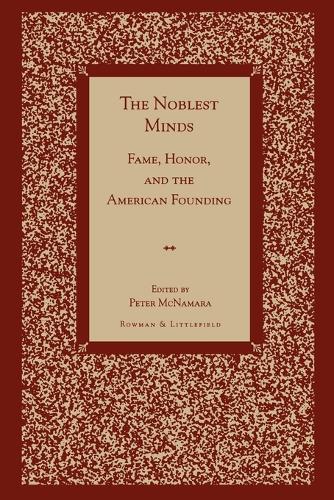
The Noblest Minds: Fame, Honor, and the American Founding
(Paperback)
Publishing Details
The Noblest Minds: Fame, Honor, and the American Founding
By (Author) Peter McNamara
Contributions by Lance Banning
Contributions by James Ceaser
Contributions by Robert Faulkner
Contributions by Steven Forde
Contributions by David Mayer
Contributions by Peter McNamara
Contributions by Lorraine Smith Pangle
Contributions by Thomas Pangle
Contributions by Paul Rahe
Bloomsbury Publishing PLC
Rowman & Littlefield Publishers
28th May 1999
United States
Classifications
Tertiary Education
Non Fiction
History of the Americas
973.30922
Physical Properties
Paperback
246
Width 146mm, Height 231mm, Spine 14mm
336g
Description
Ever since Douglass Adair convincingly demonstrated that a love of fame was central to the American founding, political scientists and historians have started to view the founders and their acts in a new light. In The Noblest Minds, ten distinguished scholars examine this passion for fame and honor and demonstrate for the first time its significance in the development of American democracy. The first two-thirds of the book is devoted to essays on individual founders, as the contributors consider the role of fame in the lives and political characters of Washington, Franklin, Madison, Jefferson, Hamilton, Adams, and Marshall. The remaining chapters analyze the founders' theoretical accomplishment in reviving political science, and explore the problem of honor in the modern world. Political scientists and American historians alike will find this book to be valuable and illuminating. What made the founding generation of American statesmen so outstanding To answer this question, The Noblest Minds brings together a distinguished group of historians and political scientists to evaluate a neglected but compelling theory advanced nearly four decades ago by Douglass Adair. Adair argued that it was the "love of fame" that moved many of the leading lights of the founding generation. Adair's thesis is the starting point for a series of searching essays on the role of fame in the lives of Adams, Franklin, Hamilton, Jefferson, Madison, Marshall, and Washington. These profiles also provide wide-ranging historical and philosophical reflections on the question of fame. What emerges from these essays is a more complex picture of the founding generation than that presented by Adair. While acknowledging the role of the love of fame, The Noblest Minds argues for the influence of other concerns such as honor, virtue, and the cause of liberty. This more complex picture of the founding generation provides a unique and rewarding vantage point from which to consider the question of "character" in politics, which
Reviews
This collection would serve as excellent outside reading for courses in American political theory or for those that focus on the founding period. * American Political Science Review *
This work is an important contribution to its field. . . . Contributes mightily to a rethinking of the foundations of politics. Students of politics have fully attended to fear and greed as low motives in human life; this work points the way toward a more adequate treatment of the specifically political motive of lofty ambition. -- Harvey Flaumenhaft, St. John's College
Author Bio
Peter McNamara is associate professor of political science at Utah State University, is the author of Political Economy and Statesmanship: Adam Smith and Alexander Hamilton on the Foundation of the Commercial Republic, as well as numerous articles.
